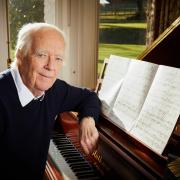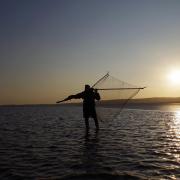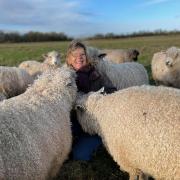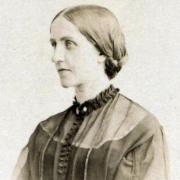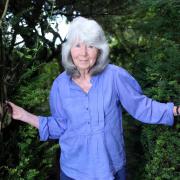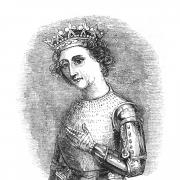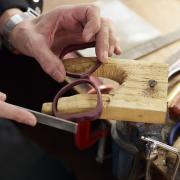When Katie Jarvis finally gets technology to play ball, she enjoys an enlightening chat with Mark Gatiss and Ian Hallard about their new play coming to Cheltenham and Oxford as part of its UK tour... and asks whether being an ABBA fan is now the ultimate in cool.
Reader, YOU NEED TO UNDERSTAND THE STRESS.
So.
I log onto my Zoom call with Mark Gatiss and Ian Hallard. Exciting! (My editor has asked me to get them to sign a napkin for her.) (Tricky over Zoom but I appreciate the enthusiasm.)
As the screen boings wildly, I realise we have a problem. It is Mark Gatiss… but with such bad signal, I’ve been less scared watching high-octane episodes of Doctor Who. (Which I was once banned from, owing to a nightmare where I was chased by Daleks.)
‘Is it just you?’ I ask, peering at Ectoplasmic Mark. I can’t see Ian at all.
Mark boings an explanation as he swings a camera round to where Ian is snaffling remnants of breakfast.

But get this.
The visuals are so bad, I can’t tell you what Ian is eating!
So, to move on…
(No. Sorry. Still thinking about this. Croissant? Bacon sandwich? The agonising truth is, I just don’t know.)
The sound quality deteriorates further. Think BBC drama.
(That bad.)
(You know – where BBC executives somehow decide it would be even better for Happy Valley viewers if Sarah Lancashire were to overdub the soundtrack, but this time with her head in a bucket.)
I’m by now well into my allotted 30-minute interview-slot. So, I panic-call the nice PR man who organised it and sob down the phone.)
‘Not a problem,’ he says, in the calming way nice PR men do. ‘I’ll give them your phone number.’
‘Landline!’ I shout, hysterically, on the basis that – by this point – I only have faith in wires I can follow on my hands and knees to the end-user.
The nice PR man calls back. ‘Odd... They’re ringing and ringing and there’s no reply.’
As I puzzle, an image floats unbidden into my mind.
*Me, turning off the landline so as not to interrupt my Zoom interview*
An older, sadder version of myself finally answers the phone to Mark Gatiss and Ian Hallard.
‘Hello – and I’m afraid that’s all we’ve got time for,’ Mark Gatiss says.
IT’S THE ULTIMATE BOGOF. (Am I allowed to say that? I mean it in an utterly thrilled way.)

Because I get to interview both Ian Hallard AND Mark Gatiss. Together.
The thing is this. Ian has written a new play – The Way Old Friends Do – which his husband, Mark, is directing. (They’ve worked together before, but never in this particular writer/director/stage combo).
And the other, other thing is this. It’s a comedy about two old friends – middle-aged men – forming the world’s first drag ABBA tribute band.
‘They always say to write about what you know,’ Ian explains.
Ish.
To be fair, even his own friends, to begin with, misunderstood and thought he was actually setting up a drag ABBA tribute band. (They were beyond excited.) (And, genuinely, that would have been a world-first, as far as Ian’s extensive Googling could ascertain.)
But ‘what he knew’ was more along the lines of two old school-friends, who’d grown up together in the 1980s (as did Ian) in Birmingham (as did Ian), meeting by chance 30 years later. The key factors are that – back in 1988 – these two friends had come out to one another: one as gay; the other – ‘more shockingly’ – as an ABBA fan.
READ MORE: Bjorn Ulvaeus welcomes millionth Abba Voyage customer
‘I think people forget - now ABBA are so universally popular - that they went through a very dark period in the mid-to-late 80s when they were so uncool. I mean, they were never cool when they were together. But they became so unfashionable.’
That now barely-believable truth coincided with Ian’s teenage years. ‘I remember requesting Dancing Queen at the school disco and having the DJ openly laugh in my face: ‘Why would I have an ABBA song?’’

There’s an emotionally unidentifiable noise-intervention from Mark Gatiss. (Even though we’ve resorted to phone, they’ve agreed to make things easier for me. ‘I’ll overdo the Brummie accent,’ Ian says, generously running over his vowels with a steam-roller. ‘Mark can overdo the North Eastern one.’)
Possibly as a result of that noise-intervention: ‘I was certainly never in the closet about liking ABBA,’ Ian adds.
It is intriguing, though – why ABBA had such a big fan-base amongst the gay community.
‘The irony is that they were two married and then divorced couples, so their image couldn’t have been more heterosexual in some ways.’
Mystery.
‘Even now, when Björn [Ulvaeus, from ABBA] guest-edited the Today programme over Christmas, one of the items he was interested in exploring was just why ABBA had such an appeal to the LGBTQ community. I don’t think anyone can completely quantify it but there’s obviously some reason why so many gay people are ABBA fans.’
THERE’S SOMETHING ELSE I’d like to explore, too: the very nature of comedy.
(I’m not lacking ambition.)
And who better to ask? Mark Gatiss, actor, comedian (et al); writer for Doctor Who, Sherlock, Game of Thrones; member of comedy team The League of Gentlemen.
Ian Hallard, distinguished actor and writer.
Mark’s description of coming out to his parents (his dad a slightly intimidating, in some ways admirable, but unreconstructed mining engineer) is nothing if-not funny.
He told his mum first, who baulked at his dad knowing. Finally, in a phone call to Mark, she said (at 60mph), ‘We’ve had snow. I’ve told your dad.’
And The Way Old Friends Do for sure promises to be laugh-out-loud funny.

They did promo-photos the other day – in costume for the first time. (As we speak, they’re mid-rehearsal-period.)
Mark had never seen the cast in full wig and make-up before. ‘There was this very moving and tear-jerking bit and I suddenly started laughing because of what everybody was wearing.’
Yet behind all this, there is pain. There had to be pain. There still must be pain.
Humour linked with desperately sensitive issues is a fascinating theme. It marks a triumph that we can make it funny and light-hearted. Yet how can issues that have caused people to suffer so much become funny?
‘All my favourite comedy – and the foundation of all the comedy I have ever done, really - has pathos at its heart. Because that’s what comedy is,’ Mark says. ‘It baffles me when people fail to realise that. I’m always banging on about the fact that Steptoe is two trapped people in a difficult life-situation.’

No one ever laughs at normality and success, I guess.
‘It’s the human condition – laughter out of tears, isn’t it?’
Completely.
Interesting, too, that many of our great gay icons (Kenneth Williams; Larry Grayson, whom Mark recently played in the TV drama Nolly) were only accepted because they agreed to be funny. That was the contract with the public.
‘And a sort of asexuality. Boy George and his ‘I’d rather have a cup of tea’. They were allowed to be in people’s front rooms as long as you didn’t refer to what they actually did. It sort of continues to this day: the evolutionary niche occupied by the camp icon is still there in light entertainment.’
‘I don’t know,’ Ian muses. ‘If you watch an episode of Strictly, you’ve got Craig and - until very recently - Bruno openly lusting over male celebrities in a way that wouldn’t be permissible if a straight judge did that to female celebrities.’
‘Is that progress?!?’ (Mark, with a laugh.) ‘There was a great triumphal moment in EastEnders recently when they got Colin and Barry back together to have a proper kiss on screen, 30-odd years after their peck on the cheek - which produced headlines in the Sun. You look back now and you just cannot believe it’s such a short time ago how ghastly that atmosphere was.’
The play isn’t autobiographical: ‘But the characters grew up at the same time that I did – in that whirlwind of terror about HIV and AIDS, Section 28. I remember my nan and granddad used to get all the tabloids: the Sun, the Mirror and the News of the World.
Whenever we went round to theirs, I did read them, and it was page after page of homophobia and poofs and all that sort of thing.’
How did that make him feel, if it’s not a stupid question?

‘Errm. Just – this is what my life’s going to be like. It’s just going to be difficult and I’m going to have to be very careful either not to die of AIDS or kill myself.’
‘By the way,’ Mark adds, ‘this show is a lot of fun!’
YOU WANT POLITICS? (Not really offering a choice, tbh.)
Culture isn’t perfect. It doesn’t offer every voice the chance to be heard. (To be contrarian (and Mark is vocally anti-Brexit), as he points out, how many pro-Brexit plays are commissioned? Come to that, how much of the population goes to the theatre just once a year - for panto, at most?)
But it does, I suggest, offer an antidote to the deliberate and current trend for sloganised politics.
The one-word confounding of complex issues.
Surely we need our under-threat (under-funded) culture more than ever: a way to examine these things properly in an environment where entertainment, not bombastic or didactic stonewalling, is the vehicle.
‘Without sounding too high-falutin, that’s a function of art. I always think Arthur Miller could have written a direct response to the McCarthy trials; but he wrote The Crucible. It’s about the McCarthy witch-hunt, but it’s universal.’
‘And that’s what I try to do with the play. There is pain in there. One of the characters was expelled from school because he made a pass at another teenage boy. And the other character has never felt able come out. But it’s handled, I hope, with a lighter touch - and jokes about ABBA.’
MOST IMPORTANT question left until last.
Do they know the Cotswolds well?
‘Yeah, quite well,’ says Ian. Or Mark. (They’ve forgotten to overdo the accents, but I’m not complaining.)
‘We stayed for a month in Stroud last summer. We had a glorious August there.’
They weren’t meant to stay that long.
‘But we ended up house-sitting and dog-sitting for some very good friends of ours.’
Of course. The way old friends do.
The Way Old Friends Do, by Ian Hallard - directed by Mark Gatiss - will be at the Everyman, Cheltenham, from May 8-13 as part of a UK tour: everymantheatre.org.uk; and Oxford Playhouse from May 15-20: oxfordplayhouse.com





